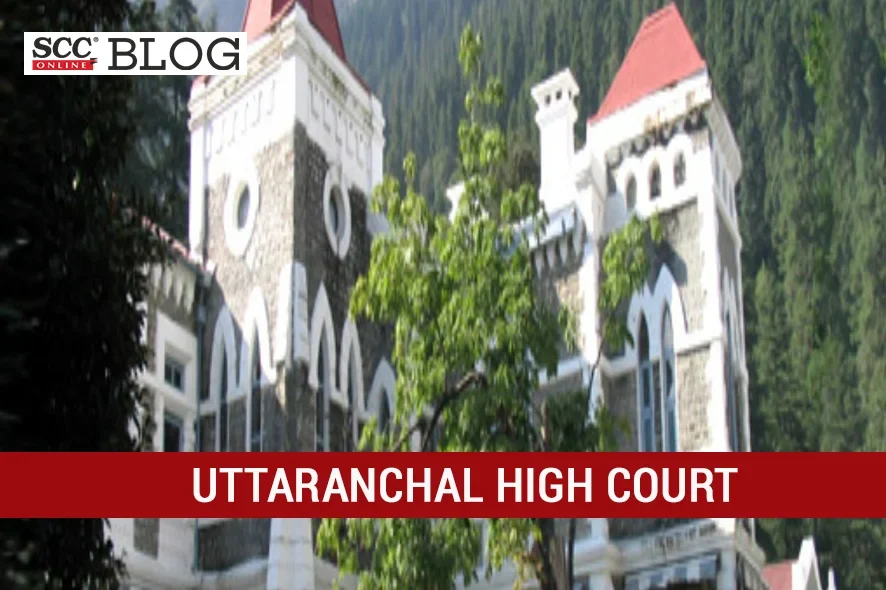Uttaranchal High Court: In a case wherein the Court took Suo Motu cognizance after it came across a video in which Indian Cricketer Virat Kohli was conveying the message and importance of playing sports at young age, the Division bench of Vipin Sanghi, C.J., and Rakesh Thapliyal, J., opined that the State should also reconsider their policy of developing or permitting the development of parks and lawns in colonies/localities, and public parks, for ornamental purposes, at the cost of denying open spaces and playgrounds to children and youth for pursuing outdoor sporting activities. The Court thus directed Union of India and the State to file their respective responses on the issues raised in the present case.
The Court came across a social media post, a video in particular, which had struck a chord and hence this Court considered it appropriate to take up the cause exhibited in the said video in public interest, to understand as to what policy the State had formulated, and what policy it might frame henceforth to address the issue of deprivation of the rights of children to play in lawns, playgrounds, and open areas, in their respective localities. The video that the Court came across showed Indian Cricketer Virat Kohli responding to a grievance raised by a young boy to him, that the elders in the locality, where he resided, did not permit him, and other children, to play cricket.
The Court observed that “outdoor physical sporting activities contributed greatly to the physical and mental well-being of children. Sporting activities, when undertaken, lead to development of the qualities of valour and camaraderie between the children; they learn to compete; they even learn how to accept defeat, and; strong and unforgettable childhood friendships develop amongst them. The children are innocent and, therefore, unmindful of whom to play with, and considerations of caste or creed do not come in their way, when they play with the other children, and bond with them”.
The Court opined that “it was a hard reality that it was the elders in our localities and colonies, who took decisions, as to how the open spaces and areas were to be managed”. The Court opined that “often open spaces were turned into ornamental parks with trees planted all over, leaving hardly any space for any sporting activity. Right in the middle of the parks and lawns, fountains were erected, which rarely function. The parks were filled with benches for the elderly people and toddlers to sit, and unfortunately, there was hardly any consideration shown to the needs of the children and youth, to pursue outdoor sporting activities in their localities and colonies”.
The Court observed that children were not permitted to play freely in open parks within their localities and colonies, least the games that they play, which usually happened to be cricket or football, as it resulted in the ball landing, either on somebody’s roof , thereby damaging the lights etc., or on car, or breaking the windshield, or a glass window. Due to the aforesaid, the Court opined that “children and youth were denied a very vital and fundamental right which they have, to enjoy their childhood, and grow in the healthiest way. They were denied a good environment, wherein they could pursue sports, which greatly contributed to their physical and mental growth”.
The Court noted that the Central Government had come up with the ‘Khelo India’ scheme/policy but opined that merely opening up stadiums and large playgrounds for the public at large, might not be sufficient to address the issues raised in the video, as most families would not have the resources, or the time, to drop and pick up children from such stadium and parks, on a daily basis, preventing them to pursue their outdoor sporting activities. The Court thus further opined that it was necessary that children should be free to play the outdoor sports which they wish to play, within their colonies and localities, under the gaze of their parents and caregivers from their own homes.
The Court directed that if the State had not yet formulated any policy to address the issues in the present case, then the State must look into the issues arising from the video. The Court further stated that the respondents were obligated to protect the rights and interests of children and youth, to play outdoor sports in their colonies, localities, and surroundings. The Court stated that to address the concerns of all sections and age groups, particularly, the elders, who considered younger children playing sports in the locality as a nuisance, the State could decide to provide and erect nets/fencing on the exterior boundaries of the playing area, or provide such other facilities, as were considered necessary to prevent any inconvenience to anyone, when children and youth pursue their outdoor sporting activities. The Court further opined that the State should also reconsider their policy of developing or permitting the development of parks and lawns — in colonies/localities, and public parks, for ornamental purposes, at the cost of denying open spaces and playgrounds to children and youth for pursuing outdoor sporting activities. The Court thus directed Union of India and the State to file their respective responses on the issues raised in the present case.
The matter would next be listed on 09-10-2023.
[In the matter of “Let the Children Play” by increasing the facilities of sports, In Re, 2023 SCC OnLine Utt 1169, Order dated 18-09-2023]
Advocates who appeared in this case :
For the Respondents: Mr. Rajeev Singh Bisht, Additional Chief Standing Counsel, Mr. Gajendra Tripathi, Standing Counsel, Mr. Lalit Sharma, Standing Counsel






